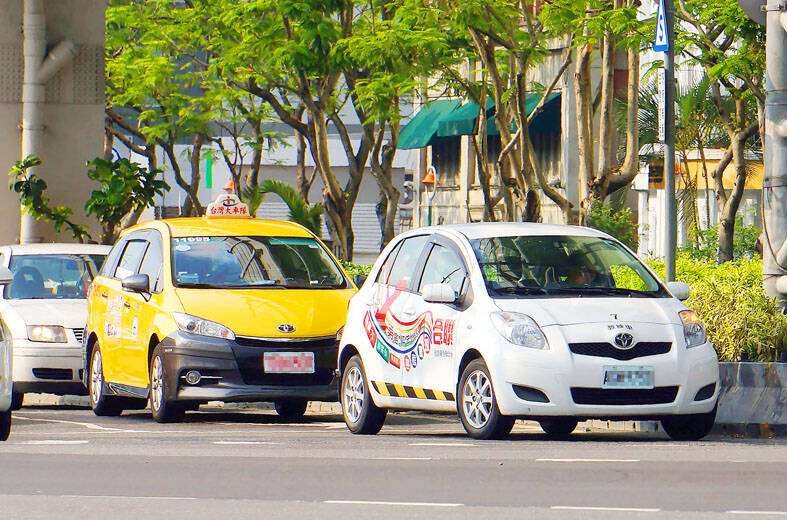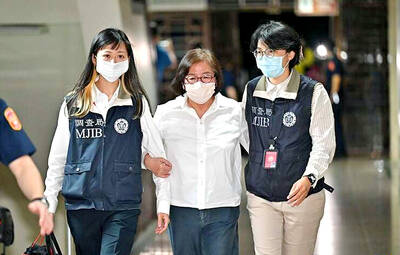Several road safety groups yesterday panned the Highway Bureau for its plan to introduce a mandatory “pointing and calling” requirement in driving tests, saying the “stupid” regulation lacked consensus from civic groups and could compromise traffic safety.
After a meeting with road safety groups on Friday, bureau officials told reporters that starting on June 2, the driving test for sedans would include a new “pointing and calling” requirement, Taiwan Vision Zero Alliance chairperson Luna Chen (陳愷寧) told a news conference in Taipei.
Learner drivers who fail to perform the newly required action during the test would not pass, she added.

Photo: CNA
“Everyone agrees this is a stupid regulation, yet the government rushed to make the decision and even issued a press release using civic groups as endorsement tools,” Chen said.
She said the bureau showed “a complete lack of respect” toward civic groups.
“Pointing and calling” is a safety confirmation method that originated in Japan, involving gesture and verbal confirmation to prevent operational errors, Minister of Transportation and Communications Chen Shih-kai (陳世凱) said on social media in October last year.
In Taiwan, only drivers of certain bus lines are required to perform such checks — stopping their vehicles, pointing to the left, front and right, and verbally confirming that no pedestrians are present — before turning at intersections, alliance member Teddy Lin (林柏勛) said.
Even drivers of large trucks have since August last year only been asked to follow a non-mandatory government campaign to stop before turning, with no requirement for “pointing and calling” checks, Lin said.
“In Europe and the United States, where driving behavior is more strictly regulated, drivers are only required to perform a head turn to check, commonly known as a ‘shoulder check,’” he added.
His alliance opposes the new requirement for sedans, as it would not only be difficult to enforce, but would also disrupt smooth traffic flow, thereby compromising safety, he said.
Roy Lo (羅宜), a member of the Taiwan Motorcycle Rights Promotion Association, said that requiring more vehicles to perform “pointing and calling” would significantly slow down traffic.
“How many cars would even be able to pass through a single traffic light cycle under such conditions?” Lo asked.
Lin suggested that all drivers should be required to perform “shoulder checks” at intersections and crosswalks and check their blind spots — steps that are not clearly mandated under current regulations.
In a statement issued on Monday, the bureau said the new “pointing and calling” requirement for the sedan driving test was still being “discussed internally,” and June 2 was a proposed implementation date, and has not yet been finalized.
Given differing public opinions, the bureau said it would continue to consult with relevant stakeholders and review the policy as needed to ensure it “better meets practical needs.”
The bureau did not ask civic groups to endorse the new requirement, it added.

Costa Rica sent a group of intelligence officials to Taiwan for a short-term training program, the first time the Central American country has done so since the countries ended official diplomatic relations in 2007, a Costa Rican media outlet reported last week. Five officials from the Costa Rican Directorate of Intelligence and Security last month spent 23 days in Taipei undergoing a series of training sessions focused on national security, La Nacion reported on Friday, quoting unnamed sources. The Costa Rican government has not confirmed the report. The Chinese embassy in Costa Rica protested the news, saying in a statement issued the same

Taiwan is to extend its visa-waiver program for Philippine passport holders for another year, starting on Aug. 1, Minister of Foreign Affairs Lin Chia-lung (林佳龍) said on Friday. Lin made the announcement during a reception in Taipei marking the 127th anniversary of Philippine independence and the 50th anniversary of the establishment of the Manila Economic and Cultural Office (MECO) in Taiwan, the Ministry of Foreign Affairs said. The decision reflected Taiwan’s commitment to deepening exchanges with the Philippines, the statement cited Lin as saying, adding that it was a key partner under the New Southbound Policy launched in 2016. Lin also expressed hope

Temperatures in New Taipei City’s Sindian District (新店) climbed past 37°C yesterday, as the Central Weather Administration (CWA) issued heat alerts for 16 municipalities, warning the public of intense heat expected across Taiwan. The hottest location in Taiwan was in Sindian, where the mercury reached 37.5°C at about 2pm, according to CWA data. Taipei’s Shilin District (士林) recorded a temperature of 37.4°C at noon, Taitung County’s Jinfeng Township (金峰) at 12:50 pm logged a temperature of 37.4°C and Miaoli County’s Toufen Township (頭份) reached 36.7°C at 11:40am, the CWA said. The weather agency yesterday issued a yellow level information notice for Taipei, New

CASE: Prosecutors have requested heavy sentences, citing a lack of remorse and the defendants’ role in ‘undermining the country’s democratic foundations’ Five people affiliated with the Chinese Nationalist Party (KMT), including senior staff from the party’s Taipei branch, were indicted yesterday for allegedly forging thousands of signatures to recall two Democratic Progressive Party (DPP) lawmakers. Those indicted include KMT Taipei chapter director Huang Lu Chin-ru (黃呂錦茹), secretary-general Chu Wen-ching (初文卿) and secretary Yao Fu-wen (姚富文), the Taipei District Prosecutors’ Office said in a news release. Prosecutors said the three were responsible for fabricating 5,211 signature forms — 2,537 related to the recall of DPP Legislator Wu Pei-yi (吳沛憶) and 2,674 for DPP Legislator Rosalia Wu (吳思瑤) — with forged entries accounting for